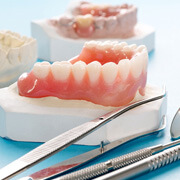Dentures – Brookfield, WI
Renewing Lost Pearly Whites
Do you have some or all of your teeth missing from your smile? You aren’t the only one. More than 120 million Americans are facing the same issue. Fortunately, you don’t have to settle for this condition for the rest of your life, especially since it can make certain everyday tasks difficult to do, such as eating comfortably and speaking clearly. Our team can effectively restore your missing teeth with dentures. These lifelike and durable prosthetics can help you regain your bite as well as your confidence, and they can last many years with proper care. Want to know more about dentures? Read on or give us a call today to schedule an appointment!

Why Choose Bright Smiles Dentistry for Dentures?
- Highly-Trained & Experienced Dental Team
- Durable & Custom-Designed Restorations
- Utilize Digital Impressions for Perfect Results
Who Is a Good Candidate for Dentures?

Due to the advancements in dentistry and digital impression technology, almost everyone can be a good candidate for dentures. When you first visit us, we’ll go over your oral health and discuss your lifestyle habits and smile goals. This will help us determine if dentures are an ideal option for you. If you have certain oral health problems that require preliminary procedures, such as gum disease therapy or tooth extractions, then we can provide the treatments you need to get you ready for your future prosthetics.
Effects of Missing Teeth

Tooth loss can happen for any number of reasons, ranging from physical injury to gum disease and tooth decay. Whichever the case is, most situations are preventable early on and should be treated ahead of time before they can worsen.
If you’re already experiencing tooth loss, then you might be aware of the negative side effects this can have on your oral and overall health. The jawbone can begin to shrink due to a lack of stimulation in the bone, which can increase the risk of further tooth loss. Additionally, you might have trouble eating and talking comfortably—which can end up lowering your confidence in the long run.
What Qualifies You for Dentures?

If you’re missing most or all of your teeth, then you’ll likely be eligible for dentures. This tooth replacement option has been used for decades and provides an effective and convenient way to restore your bite. Of course, if you have any underlying issues like gum disease or infection, then we’ll need to address these before moving forward.
The type of denture you’ll receive will depend mostly on the number of teeth that you’re missing. For instance, missing several teeth in different locations might require a partial denture, whereas restoring an entire arch will usually need a full denture. You also might be eligible for this treatment if you’re working with a budget, as it’s more affordable compared to other solutions.
Alternative Tooth-Replacement Options

If you aren’t a good candidate for dentures, that’s okay! You can still explore alternative options for restoring your missing pearly whites. Here are a couple of the treatments we can offer:
- Dental bridges: This tooth replacement is usually reserved for replacing one or a few missing teeth in a row. A dental bridge consists of two dental crowns connected via pontics (artificial teeth) to close the gap. This procedure involves removing a small amount of enamel to make room for restorations.
- Dental implants: These titanium posts will be embedded directly into the jawbone, providing the most stable foundation for your chosen restoration. Furthermore, they stimulate circulation in the bone tissue, promoting a healthier and more youthful facial structure. Dental implants also don’t rely on the gums or nearby teeth for support, and your results can last decades or the rest of your life depending on how well you care for them.
Types of Dentures

Dentures can come in different shapes, sizes, and types! The most common kinds of prosthetics you can expect to choose from include:
Partial Dentures

These dentures are designed to replace a certain amount of missing teeth and not the entire arch. It’s a perfectly viable solution for patients who are experiencing mild to moderate tooth loss but have still retained some of their natural pearly whites. The gum-colored base is fitted onto the gumline via a discreet metal framework to hold your artificial teeth in place.
Full Dentures

Full dentures are the main kind of prosthetics people imagine, which can replace an entire arch of missing teeth. The artificial teeth and gum-colored base are kept on the gumline via natural suction, denture adhesive, or a combination of the two. On top of being durable and natural-looking, they’re also easy to maintain and can last 10+ years with proper care.
Implant Dentures

Unlike traditional dentures, this kind utilizes dental implants to secure them to your jawbone. This will provide a more secure foundation for your prosthetics, allowing you to eat and speak freely while also preserving your youthful facial shape. With minimal dental care, they can last several decades!
How Dentures Are Made

Dentures have the potential to increase your quality of life! One reason why they are so effective is the fact that each prosthetic is carefully custom-made for the patient who will wear it. We pay great attention to detail during every phase of the denture creation process, all with the goal of giving you a functional and beautiful smile that you can be proud of. Would you like to learn more details about how dentures are made? You will find some fascinating details below:
What Are Dentures Made Of?

Dentures consist of two main parts:
- The base of dentures is usually made of gum-colored acrylic, a material that tends to sit comfortably on the gums. In partial dentures, the base has small metal or acrylic attachments that help the artificial teeth to stay secure during eating and speaking. In some cases, nylon or resin is used instead of acrylic for the base of dentures.
- The teeth of dentures are often made of either acrylic or porcelain. Acrylic is usually favored for patients who still have some of their natural teeth, whereas porcelain is more commonly recommended for patients who require full-mouth replacement.
The Denture Creation Process

Here is a basic overview of the denture creation process:
- We take detailed impressions of your mouth. Advanced technology will be used to capture an accurate representation of your dental arches. The impressions will be used as the basis for creating a plaster model.
- We send the plaster model to a dental lab. Lab technicians will use the plaster cast to create a wax version of your gumline. A machine known as an articulator will then place artificial teeth into the wax gumline.
- You visit us for a fitting. We will invite you to our office so we can use the wax-up of your dentures to check how they fit in your mouth. We will continue to coordinate with the dental lab as they use the wax-up and our notes to create your final prosthetic.
- You receive your dentures. When your dentures are ready, you will see us for a final fitting. If necessary, we can make minor adjustments to them in-office.
Adjusting to Your New Dentures

At first, your dentures may feel strange or even uncomfortable in your mouth. Be patient. Some people require a few weeks or even a few months to completely adapt to their prosthetic. In the meantime, you should wear your denture regularly. Practice eating and speaking with it. If necessary, use a bit of adhesive to keep it in place. If you run into any significant problems with your denture, reach out to our team. We may be able to make minor adjustments to help your prosthetic fit and function better.
Benefits of Dentures

When you are missing multiple teeth, it can be difficult to complete tasks that you once found easy. Fortunately, dentures are a lift-changing tooth replacement option for people who are missing several, most of, or all of their teeth thanks to the prosthetic’s ability to improve quality of life. If you have experienced tooth loss, here are some of the benefits that you can experience with dentures.
Psychological Benefits

People who don’t have any teeth often have difficulty accepting tooth loss. Along with this comes effects on self-esteem and social life, as well as a higher risk of experiencing sadness and depression. By restoring the appearance and function of one’s smile with dentures, patients are likely to experience increased confidence and self-esteem. Dentures are able to reduce anxieties about appearance, speech articulation, chewing ability, and more while engaging socially.
Clearer Enunciation

Missing teeth can make it more difficult to speak. In order to pronounce and perform words, your lips and tongue need to be positioned properly. Without being able to touch your tongue to your teeth, some words are very difficult to say clearly. Dentures act as your missing teeth, therefore allowing you to enunciate more clearly while speaking. After a short adjustment period and a little bit of practice, speaking will come naturally.
Improves Nutrition
Lots of nutritious foods are tough in texture. This includes vegetables, fruits, and healthy proteins. When you are unable to chew your food thoroughly thanks to tooth loss, you can experience issues like indigestion and malnutrition. With an improved ability to chew, dentures allow for a more expansive diet full of nutritious foods. Ultimately, dentures can help you receive the essential nutrients you need to thrive.
Preserves Oral Health

If you still have some remaining natural teeth, getting dentures can help to prevent them from shifting around to fill in the gaps. Dentures can also bear some of the weight of regular chewing, therefore reducing the wear and tear of the existing teeth.
Expands Opportunity

First impressions are important when it comes to job interviews, sales, and getting promotions. Your smile is one of the first things that people notice about you, so having a complete smile is nothing but an advantage. In fact, according to a 2019 study, the probability of being employed was negatively associated with having poor oral health.
Understanding the Cost of Dentures

You’ll need to know a denture’s price before you get one. That’s only natural – you can’t buy these prosthetic teeth if they exceed your budget. Even so, the cost of dentures varies from patient to patient. You’ll need to consult our dentists for a precise estimate. Our dental team can then find ways to make your care more affordable. In fact, we’ll gladly walk you through dentures’ cost factors and payment options. Read on or call our office to learn more details!
Factors That Affect the Cost of Dentures

Our dentists will conduct an oral exam at your consultation visit. Among other things, this step will review factors that affect your treatment cost. The most common of these elements are:
- Preparatory Work – You may need preliminary services before you get dentures. (Such options can range from tooth removal to gum disease therapy.) If so, your treatment costs will rise.
- Acrylic Base Type – A denture’s base can use varying kinds of acrylic. Depending on the type, the latter material will raise or lower your expenses.
- Replacement Teeth Material – A denture’s artificial teeth are acrylic or porcelain. Acrylic ones are cheaper but short-lived. Meanwhile, porcelain teeth cost a lot and last longer.
Along with the factors above, remember that cheap dentures aren’t good. Such kinds depend on subpar acrylic and inferior tooth materials. So, get dentures that you know are high-quality!
Are Implant Dentures More Expensive?

Yes, implant dentures have a higher upfront price than regular ones. That said, their unique benefits justify the elevated cost.
Firstly, implant dentures stay secure with dental implants. The latter are set in your jaw and slowly fuse with it over time. As a result, an implant denture is permanent and won’t slip or fall. It also looks and works well enough that it’ll improve your confidence.
An implant denture is also a wise investment. After all, its implants can last 15-30 years with proper care. A regular denture would only have a 5–7-year lifespan. To that extent, the former kind is more cost-effective in the long run. It’ll require fewer repair or replacement visits.
Does Dental Insurance Cover Dentures?

Fortunately, dental insurance usually does cover dentures. The average plan views the prosthetics as medically necessary. So, it’ll typically cover up to 50% of a denture’s cost.
On the other hand, there are exceptions. Some dental plans have limited or no denture coverage. You’d thus be wise to confirm your benefits before treatment. If you’d like, we’ll even help you do so.
Other Options for Making Dentures Affordable

Even without insurance, there are other ways to make dentures affordable. The best of these alternatives are a practice’s payment options. Given the right one, dentures can cost a lot less.
Consider Bright Smiles Family Dentistry, for instance. Our office provides flexible financing through CareCredit. This third-party financier would let you pay for dentures in monthly installments. That way, you could cover the treatment’s cost over time.
Our dental team is eager to give you pretty and budget-friendly dentures. Therefore, learn how to finance them by visiting our office!
Dentures Aftercare

Once you’ve received your dentures and are sent on your way, you’ll need to practice certain measures to take care of them in the long run. Our team will provide you with a guideline on how to maintain your prosthetics so that you can enjoy good oral health while avoiding issues down the road. Other than visiting your dentist every six months, here are several ways to care for your dentures.
Remove After Eating
After enjoying one of your daily meals, you’ll want to remove your dentures to rinse off any debris and food particles from them. Not only will this prevent having bad breath, but it can also minimize the chances of developing plaque around your dentures. Only use lukewarm or cool water when rinsing your prosthetics, as hot water can end up warping them and causing them to not fit you anymore.
Clean Your Prosthetics
On top of taking off your dentures after eating to clean them, you’ll want to also brush them every night before heading to bed. The last thing you want is for bacteria to accumulate and form plaque while you rest. Use a soft-bristled toothbrush and mild hand soap or denture cleanser to thoroughly clean them. Avoid using regular toothpaste, which can be abrasive and damage the material of your prosthetics. If you aren’t going to put your dentures back on right after, make sure to store them in a glass of water or denture-cleansing solution to keep them fresh and bacteria-free.
Keep Your Dentures Safe
When handling your dentures, you’ll want to take measures to keep them safe. While cleaning them, make sure you’re holding them over the sink or a soft towel, that way it can break their fall should they slip from your hands. This can prevent them from becoming damaged and cause you to spend more money on replacements or reparations. Make sure you also store them out of reach of small children or pets.
Remove Dentures When You Sleep
You’ll be asked to wear your brand-new dentures for the first 24 hours of receiving them. After that, you’ll need to take them off every time you go to bed. Leaving them on for too long can make your gums vulnerable to issues like sores and irritation. Not to mention your soft oral tissue may not be able to receive the essential nutrients to promote a healthy gum line. By taking them off overnight, you allow gums to rest and recover as necessary. Don’t forget to place them in water or denture cleanser while you sleep.
Notice Changes
If you ever notice anything unusual while wearing your dentures over time, make sure to notify our team as soon as possible. We’ll want to ensure your prosthetics are in good condition or if we need to make repairs or replace them altogether. You should also visit if you see any abnormalities in the rest of your mouth, such as gum sores, which may indicate that you need to visit us for help.
Dentures FAQs
Our team is eager to help you rebuild a beautiful and confident smile with dentures. Before you schedule your tooth replacement consultation, though, you may want to know more about the path that awaits you. To help you gather information, we have put together the following list of relevant FAQs. If your specific points of interest are not addressed here, call our office. We look forward to speaking with you!
Should I Have All My Teeth Pulled to Get Dentures?
Whenever possible, our team strives to help patients retain their natural teeth. Even if a tooth is significantly damaged, we might be able to repair it with a filling, crown, or other restorative treatment. Then, we may suggest that you receive a partial denture to replace any teeth that are already missing.
Of course, in some circumstances, extractions are necessary before we provide dentures. This may be the case if your natural teeth are so badly damaged that attempting to repair them would be impossible or impractical.
Can I Sleep with My Dentures?
When you first get your dentures, we may recommend that you wear them for 24 hours. Thereafter, however, you should make it your habit to remove your denture at night. Doing so allows you to thoroughly clean both your prosthetic and your mouth. This can prevent odors, sores, and infections. Plus, periodically removing your dentures can encourage blood circulation in the gums, which helps them to stay as healthy as possible.
Will It Hurt to Get Dentures?
Some parts of the denture process may cause discomfort. For example, if you need to undergo extractions, some posttreatment soreness is to be expected. When you get your dentures, they might feel uncomfortable in your mouth at first. Our team will give you tips to make the denture process as easy as possible for you.
If you experience severe or persistent pain at any point during your tooth replacement journey, let us know. We will do all we can to help you deal with the situation.
Is It Hard to Talk with Dentures?
When you first start wearing your dentures, you might develop a slight lisp. They may feel large and bulky in your mouth. With time and practice, though, it should become easier and easier to speak with dentures. Here are some tips to help you adapt:
- Speak slowly and concentrate on pronouncing each syllable.
- Read out loud or engage in small talk with family members to get used to speaking with your denture.
- If necessary, use a dab of adhesive to keep your denture in place when you are talking.
Ultimately, your enunciation may become clearer than it was before you received your prosthetic!
